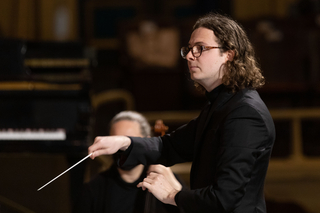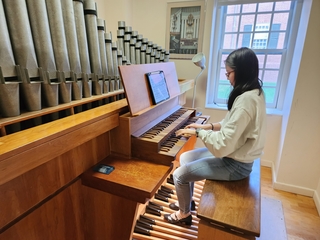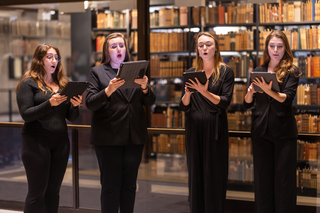Students majoring in voice at Yale are enrolled in one of two separate and distinct tracks: the Opera track (sponsored by the School of Music), and the track in Early Music, Oratorio, and Chamber Ensemble (sponsored jointly by the Institute of Sacred Music and School of Music, with James Taylor as program coordinator).
The Yale community and the New Haven area offer ample opportunities for solo experience with various Yale choral and orchestral ensembles, as well as through church positions and professional orchestras. Close proximity to New York and Boston makes attendance at performances and auditions in those cities convenient. Additionally, students have the opportunity to teach voice to undergraduates in Yale College and to non-majors in the Yale School of Music.
Information about the Opera track can be found in the bulletin of the Yale School of Music.
Voice: Early Music, Oratorio, and Chamber Ensemble
This vocal track, leading to the M.M., M.M.A., or D.M.A. is designed for the singer whose interests lie principally in the fields of early music, oratorio, art song, contemporary music, and vocal chamber ensembles.
The ISM voice track is designed to enhance and nurture the artistry of young singers by developing in them a secure technique, consummate musicianship, and stylistic versatility through instruction in performance practice and comprehensive performance experience. There is a strong emphasis on oratorio, particularly the works of Bach and Handel, as well as art song repertoire.
Program Requirements
Private voice lessons are supplemented by intensive coaching in art song and oratorio literature and by concentrated study of ensemble techniques in the chamber ensemble Yale Schola Cantorum. Schola’s touring and recording schedules provide invaluable professional experiences, and students’ participation in Schola offers the opportunity of working with such renowned conductors as Simon Carrington, Matthew Halls, Paul Hillier, Stephen Layton, Sir Neville Marriner, Nicholas McGegan, Stefan Parkman, Helmuth Rilling, Masaaki Suzuki, Jeffery Thomas, and Sir David Willcocks. Schola’s performances feature the ISM voice majors in the various solo roles.
Weekly seminars and voice classes provide in-depth instruction in performance practice; early music and art song repertoire; diction (French, German, Italian, and Latin); and Gregorian Chant. Voice majors are required to sing a recital during each year of study. Additionally, singers have the opportunity to participate in master classes by internationally renowned artists, who in recent years have included Anna Caterina Antonacci, Robin Blaze, Christian Gerhaher, Emma Kirkby, Marni Nixon, Hilary Summers, Roderick Williams, Andreas Scholl, Donald Sulzen, and Furio Zanasi.
All students of the Institute of Sacred Music are required to attend the ISM Colloquium each week of every term. Working with their adviser, voice students in the Institute of Sacred Music elect two courses from the ISM, Yale Divinity School, or Department of Religious Studies. They must complete two academic courses taught by Institute faculty by the time of graduation. With the approval of the adviser and ISM director, required School of Music Hearing and History courses may take the place of one or more of these electives. Students may petition the ISM director for exceptions to these expectations. Students are encouraged to avail themselves of the offerings of the University, particularly courses in the Department of Music.
For more precise information about the courses and requirements in this track, email the ISM’s admissions office.


